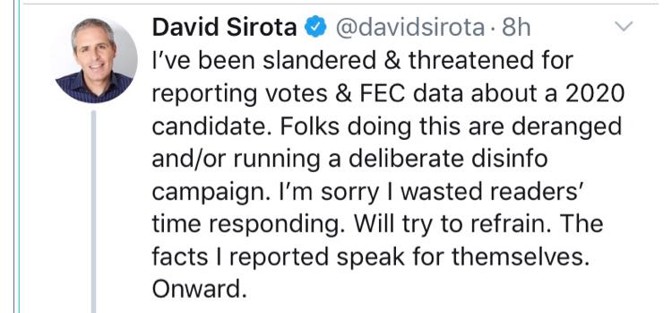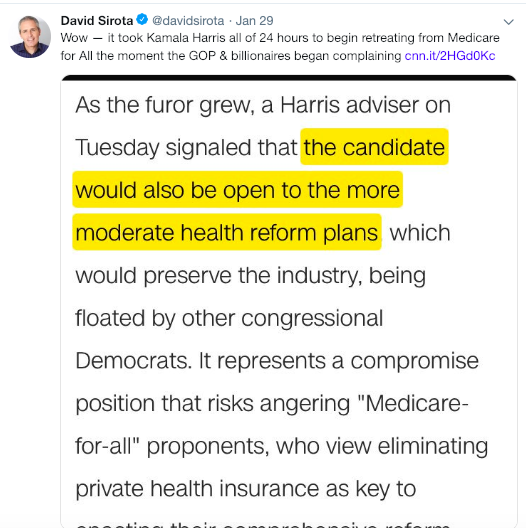Shortly before he gave speeches launching his 2020 campaign earlier this month, Bernie Sanders emailed his supporters, urging them to “do our very best to engage respectfully with our Democratic opponents—talking about the issues we are fighting for, not about personalities or past grievances. I want to be clear that I condemn bullying and harassment of any kind and in any space.”
What he didn’t include was that one of the people already advising him and helping him write those launch speeches is one of his most famously aggressive supporters online.
Since December, David Sirota has, on Twitter, on his own website, and in columns in The Guardian, been trashing most of Sanders’s Democratic opponents—all without disclosing his work with Sanders—and has been pushing back on critics by saying that he was criticizing the other Democrats as a journalist. He centered many of his attacks on Beto O’Rourke, but he also bashed Kamala Harris, Cory Booker, Joe Biden, Kirsten Gillibrand, Michael Bennet, John Hickenlooper, Mike Bloomberg, and even Andrew Cuomo.

Sirota’s hiring as a senior adviser and speechwriter was announced by the Sanders campaign on Tuesday morning after The Atlantic contacted the campaign and inquired about the undisclosed role Sirota held while attacking other Democrats.
Faiz Shakir, Sanders’s campaign manager, confirmed in an interview on Tuesday afternoon that Sirota had been in an advisory role prior to his hiring on March 11. “He was advising beforehand,” Shakir said, explaining that Sirota’s informal work for Sanders goes back months, and was meant to be a trial period to see how the senator, who famously likes to write every word that he says himself, would work with a speechwriter.
[Read: Bernie Sanders is the Democratic front-runner]
The online fury of Sanders’s supporters was one of the most defining characteristics of his 2016 campaign. Sanders himself has said he is sensitive to that, as well as to accusations that he created divisions within the Democratic Party during his 2016 run against Hillary Clinton. “Negative attacks on Democratic candidates,” Sanders said in 2018, criticizing the Democratic Congressional Campaign Committee for putting out damaging information about an opponent to a favored candidate in a primary, “just continues the process of debasing the Democratic system in this country, and is why so many people are disgusted with politics.”
When people have questioned his tactics, Sirota has called them “mentally incapacitated.” Responding in mid-January to those who criticized him online for preemptively railing against the record of O’Rourke, who had not yet entered the race but had been a huge source of concern for Sanders allies since talk of O’Rourke’s potential presidential run picked up last year, Sirota tweeted, “The screaming temper tantrums by Democratic Party operatives whenever reporters scrutinize a lawmaker’s voting record is something to behold. These people quite literally hate democracy.”
At another point, he said his critics “are deranged and/or running a deliberate disinfo campaign.” “Positively unhinged,” he wrote about them a separate time.

Read those comments, Shakir paused. “He used those exact words?” he asked. “I’m sure he regrets the tone.”
None of those comments can be found online anymore. On Monday night, after being contacted for a second time by The Atlantic with a list of specific questions about his undisclosed work for Sanders, Sirota did not respond to the email but deleted more than 20,000 tweets. He left fewer than 200 online.
On Tuesday morning, minutes after his position was announced by the Sanders campaign in a long list of new hires, Sirota said he hadn’t been able to respond to my initial inquiries because he’d been caring for his sick child. He did post a photo on Twitter of himself bowling on Monday evening, wearing a turkey hat.
[Read: Bernie Sanders’s staffers want him to be less grumpy]
In a brief emailed response, Sirota attributed the scrubbing of his account to having an “autodeleter that periodically and automatically deletes tweets. I started doing this many months ago.” He did not respond when asked if it was a coincidence that the tweets were deleted hours after I contacted him and the morning before he was announced as a Sanders employee. He did not respond to other questions about why he had not disclosed his role with Sanders either on Twitter or on his website, Capital & Main, described as a home for advocacy journalism. Sirota’s ties to Sanders go back 20 years, to when he was Sanders’s press secretary in the House of Representatives. He has always portrayed that role as a past association and nothing more, despite his continuing affinity for Sanders.
Screenshots taken before the mass Twitter deletion preserve the role that Sirota was playing to his 125,000 followers, trying to turn the early online conversation about the 2020 primary race against other candidates, all while unofficially advising Sanders.
He’s accused Harris of giving in to big donors and changing her stance on health care, and questioned how she will defend and define being “tough on crime.” He responded to Booker getting into the race by reminding people of the New Jersey senator’s defense of Bain Capital, Mitt Romney’s former company, in 2012, and a 2017 vote favored by the pharmaceutical industry that has become a big target for Sanders and his supporters.

Sirota has repeatedly attacked Bennet, his home-state senator from Colorado, over his management of the Denver school system, which he has said is “now ripped apart by chaos.” He has also attacked Hickenlooper, the former Colorado governor and a current Democratic presidential candidate, for the poor state of Colorado’s roads. He has criticized both Bennet and Hickenlooper for not responding in what he thought would have been the appropriate way during a teachers’ strike in Denver.


Responding to an NBC News op-ed in January calling Biden “the Democrats’ best chance to beat Trump,” Sirota highlighted that the author used to work for the American Legislative Exchange Council, and wrote that Biden “was just endorsed” by a former spokesperson for “the group that pushes right-wing legislation in state capitals across the country.”
Reacting to a CNBC article about Gillibrand’s outreach to big donors, he wrote at the beginning of February, “Welcome to the oligarchy,” and attacked her for the time she spent at a law firm with the tobacco company Philip Morris as a client. In another tweet, he mocked her for endorsing Representative Joe Crowley last year in his losing primary campaign against Alexandria Ocasio-Cortez.
He also knocked Bloomberg for how much of his fortune he spent on a presidential campaign, and for his “allegedly awesome climate policies,” which he contrasted by pointing out the former mayor’s support for responsible fracking.
Asked if these attacks align with the pledge for a clean and positive campaign that Sanders has made, Shakir said, “I can only promise and pledge the manner in which he is going to work on this campaign is consistent with those values.”
He said that he is sure Sirota is apologetic. “All I can say is, going forward, he is very much a team player,” Shakir said.
Meanwhile, before officially joining the Sanders campaign a little more than a week ago, Sirota promoted meetings of the campaign and the Sanders-aligned Our Revolution group.
Among the few people in the 2020 conversation whom he has said positive things about: Jay Inslee and Bill de Blasio. Both have appeared on his podcast.
And then there’s O’Rourke. Sirota went after the former Texas congressman’s campaign-finance and voting records. He then turned those into an op-ed on December 20 in The Guardian, writing that “a new analysis of congressional votes from the non-profit news organisation Capital & Main shows that even as O’Rourke represented one of the most solidly Democratic congressional districts in the United States, he has frequently voted against the majority of House Democrats in support of Republican bills and Trump administration priorities.”
“This story was reported by David Sirota of Capital & Main,” the disclaimer at the end of the article read. He wrote another op-ed two weeks later, on New Year’s Eve, headlined “Beto O’Rourke Is the New Obama. And That’s the Last Thing We Need.”
Pushing back against those who wondered why he was tearing into another Democrat, he dismissed via Twitter “the trolls trying to de-credential me & claim I’m not a ‘real journalist.’” In December, he said anyone who questioned his motives “illustrates something important: while Dems deride Trump’s war on the press, there are a cadre of Dems who try to bully campaign finance reporters if they report facts that are inconvenient to Democratic candidates.” He also tweeted that if “you are a political reporter or DC thinktanker, you see everything in front of you as a political scheme & cant fathom the idea of non-partisan issue-based missions. Election politics is the prism through which you view the world & so you assume everything is political.” He added later that he’s not engaged in “some sort of secretive political conspiracy for a particular candidate.”
Sirota sent a note to his own email list after the hiring announcement was made, writing, “I believe journalism is an extremely important and necessary line of work, and I will miss it (and one day in the future, it is possible I may return to it).”
His hiring has been in discussion among the top levels of Sanders’s campaign since before the senator launched his bid for the presidency, according to Shakir and other sources with direct knowledge of internal discussions, but Sirota did not portray it that way.
“This new job was not something I expected or planned for—but it is something I am excited to do,” he wrote in his note. “I want to express my deepest thanks to all of you who have supported my journalism work over the years—your support has meant so much to me, especially in those times when my work has generated blowback from the powerful.”



Comments
Comments are disabled for this post.